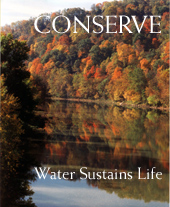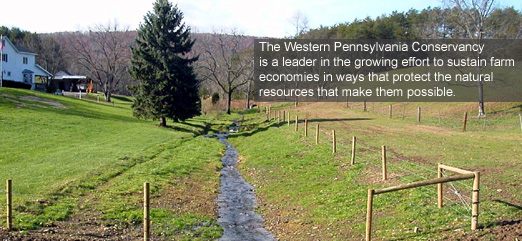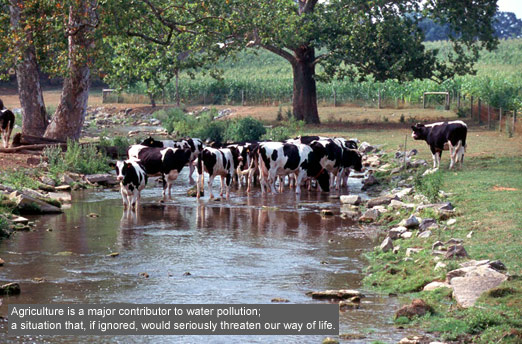The Conservation Reserve Enhancement Program (CREP)
In occupying such a dominant part of the Pennsylvania landscape, agriculture is also a major contributor to water pollution. Sediment from eroding cropland and nutrients such as nitrogen and phosphorous arising from livestock and chemical fertilizers flow from farms to nearby streams, degrading the water quality of our region’s streams and the Ohio River watershed downstream. Thanks to a cooperative effort between the WPC, 23 local organizations, the Governor’s office, Pennsylvania’s congressional delegation, and the U.S. Department of Agriculture (USDA), farmers in 16 regional counties have access to a federal program designed to improve water quality and wildlife habitat by rewarding good land management.
Environmental Quality Incentives Program (EQIP)
EQIP is a voluntary USDA- Natural Resources Conservation Service conservation program for producers to treat soil, water and related natural resource concerns. It provides technical and financial assistance to promote environmental quality in agricultural production.
Only agricultural producers, individuals or entities engaged in livestock or agricultural production may participate in EQIP. To be eligible, producers need to comply with, among other provisions, the Highly Erodible Land (HEL)/Wetland conservation provisions. For HEL, erosion must be reduced to minimum acceptable levels by the first year of the contract.
Wildlife Habitat Incentives Program (WHIP)
The Wildlife Habitat Incentive Program (WHIP) is designed to help landowners and those who are in control of acreage develop and preserve important wildlife habitat for future generations. The program offers technical assistance and cost-sharing opportunities for establishing a wildlife habitat development plan and for managing the land in accordance with that plan.
The USDA’s Natural Resources Conservation Service (NRCS) works with state and local partners to establish wildlife habitat priorities in each state. NRCS will provide cost-share payments up to 75 percent of the cost of installing wildlife habitat development practices on the land. Agreements are generally for a five to 10-year period. WHIP also provides long-term, 15-year agreements with NRCS providing up to 100 percent of the cost for implementing practices that benefit rare habitats.
| |
Water and Agriculture: “A river seems a magic thing. A magic, moving, living part of the very earth itself - for it is from the soil, both from its depth and from its surface, that a river has its beginning.” — Laura Gilpin, American Outdoor Photographer (1891 - 1979) According to a recent United Nations report “Water for Living,” when it comes to water consumption, people don’t even come close to plants. Up to 70 percent of the water we extract from ground water reserves goes to agriculture. On a worldwide scale, agriculture has been a remarkable success story, keeping pace with a human population that has roughly doubled in the past 50 years. How have farmers done it? It’s done with high-yielding seeds, new plants, pesticides and fertilizers better central strategies, and with the most critical and fragile element — fresh, clean water. WPC’s Ben Wright, watershed manager for the Upper Ohio River and assistant director of watershed programs, likens agricultural programs such as the Environmental Quality Incentive Program (EQIP), the Wildlife Habitat Incentives Program (WHIP) and the Conservation Reserve Enhancement Program (CREP) to tools in a toolbox, each designed to give farmers specific opportunities to practice sound conservation agriculture.
|
|
Go to the next article: Employing Passive Treatment for Abandoned Mine Drainage |
||



